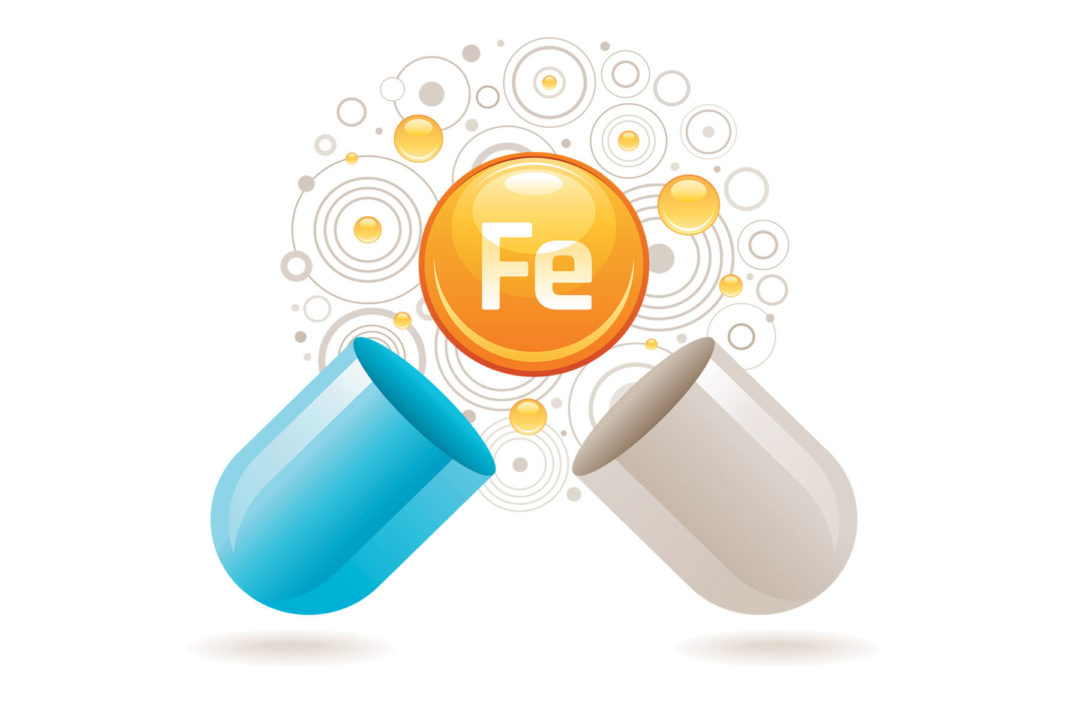Iron: An Overview
As the Office of Dietary Supplements (ODS) explains, iron is an essential component of both hemoglobin and myoglobin, two proteins that transport oxygen to tissues (2). Through myoglobin, iron also supports muscle metabolism and healthy connective tissue. ODS states that iron is also necessary for physical growth, neurological development, cellular functioning, and synthesis of some hormones. Iron is typically lost in only small amounts through bodily waste; the main way iron is lost is through menstruation or other blood loss.When it comes to optimizing levels, there are several complicating factors. For starters, iron comes in two forms: heme and nonheme (2). Plants and iron-fortified foods only contain nonheme; meat, seafood, and poultry contain both heme and nonheme iron. The National Institutes of Health (NIH) Office of Dietary Supplements (ODS) notes that heme iron has higher bioavailability than nonheme iron. An important note, especially for vegetarians: The bioavailability of nonheme iron can be enhanced by vitamin C, but phytates and certain polyphenols found in grains, beans, cereals, and legumes can decrease bioavailability. For this reason, even plant foods that are high in iron—such as spinach—may have low bioavailability, because they contain iron-absorption inhibitors. Oysters are a good source of iron, as are animal sources; plant foods including white beans are at the top of the list in terms of iron content, as are fortified breakfast cereals, although, again, plant foods can have a high iron content but a low bioavailability. Vegetarians and those who menstruate may want to consider taking an iron supplement if they’re concerned about dietary intake.Tips for taking supplements, courtesy of MedlinePlus (3):
- Avoid taking iron supplements at the same time as foods or supplements that can decrease bioavailability, including milk, high fiber foods, caffeine, calcium, or antacids.
- Consider taking vitamin C or drinking orange juice with the iron supplement to increase bioavailability.
- Iron can prevent some drugs from working as well as intended, so as always, consulting with one’s healthcare practitioner is important.
In a Health Quest Podcast episode titled “Iron Supplements that Won’t Upset Your Stomach or Cause Constipation," host Steve Lankford and Erin Stokes, N.D., discussed the issue of iron supplement side effects. Dr. Stokes noted that in her practice she’s seen women who struggled to comply with treatment, due to the side effects (5). She noted, first and foremost, that format can affect bioavailability—and that the amount on the label doesn’t translate to amount in the body. 18mg of iron in a fortified cereal may not put 18mg of iron into the body. Iron itself comes in different forms, some of which are more bioavailable than others, and, according to Dr. Stokes, while ferrous sulfate may be the most common form, it isn’t the best. She recommended MegaFood’s vegan Blood Builder, made with fermented iron bisglycinate. MegaFood’s website notes that Blood Builder was shown in an 8-week clinical trial to increase iron levels, without causing nausea or constipation.
Also addressing these concerns, IFF Health has made use of microencapsulation in their AB-Fortis, made with ferric saccharate, which is supported by a human clinical study proving its bioavailability. The company’s website explains that disadvantages ranging from metallic taste to gastrointestinal side effects “are successfully overcome by the use of AB-Fortis microencapsulated iron.”
One 2020 study examined the use of iron oxide nanoparticles in a lab and in rats, and found iron absorption levels above 79%, which the researchers stated is a level “never reported for other [iron] treatments” (6). The study noted that the treatment appeared to be well-tolerated, and concluded: “These studies show the high potential of these [nanoparticulate] preparations for their use as oral management of anemia.”
Additionally, interventions have been developed: Antioxidants can be used to prevent the formation of free radicals, preventing oxidative stress, and the study pointed towards “some new iron supplements with the ability of slow-releasing [iron], e.g. ferrous citrate liposome and EDTA iron sodium, have been successfully prepared.”
Top takeaways: Consider merchandising vitamin C with iron supplements, and placing a sign next to the supplements stating which foods and supplements can interfere with iron absorption. Stock products proven to support healthy iron levels without side effects, and keep an eye on this evolving market—there may be more to choose from soon. WFReferences
- Iron deficiency: Mayo Clinic Staff, “Iron deficiency anemia,” Mayo Clinic. Accessed 02/02/2021. https://www.mayoclinic.org/diseases-conditions/iron-deficiency-anemia/symptoms-causes/syc-20355034
- “Iron,” NIH ODS. Updated 02/28/2020. Accessed 02/01/2021. https://ods.od.nih.gov/factsheets/Iron-HealthProfessional/
- “Taking Iron Supplements,” MedlinePlus. Updated 05/06/2019. Accessed 02/01/2021. https://medlineplus.gov/ency/article/007478.htm
- Xiao Qi et al., “Mechanism and intervention measures of iron side effects on the intestine,” Critical Reviews in Food Science and Nutrition. 60(12). 2113-2125(2019). https://www.tandfonline.com/doi/abs/10.1080/10408398.2019.1630599
- Steve Lankford, “An iron supplement that won’t upset your stomach or cause constipation,” Health Quest Podcast. Posted 03/02/2015. Accessed 02/01/2021. https://wholefoodsmagazine.com/multimedia/podcast/iron-supplement-wont-upset-your-stomach-or-cause-constipation/
- Jenifer Garcia-Fernandez, “In vitro and in situ experiments to evaluate biodistribution and cellular toxicity of ultrasmall iron oxide nanoparticles potentially used as oral iron supplements,” Nanotoxicology. 14(3). 388-403(2020). https://www.sciencedirect.com/science/article/abs/pii/S0924224419307290









